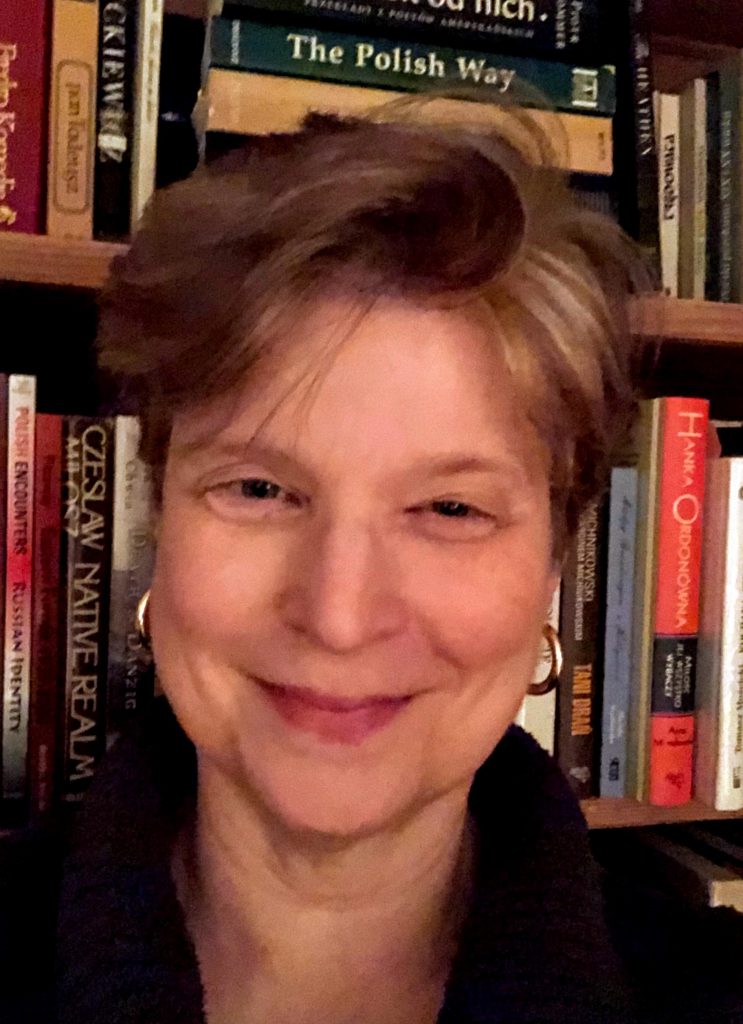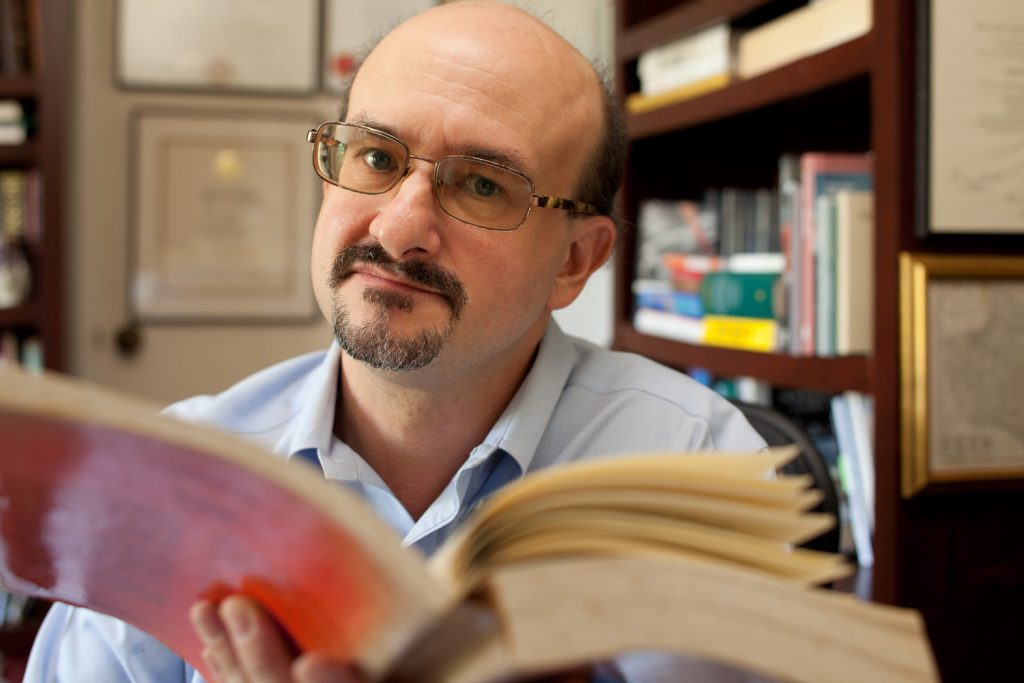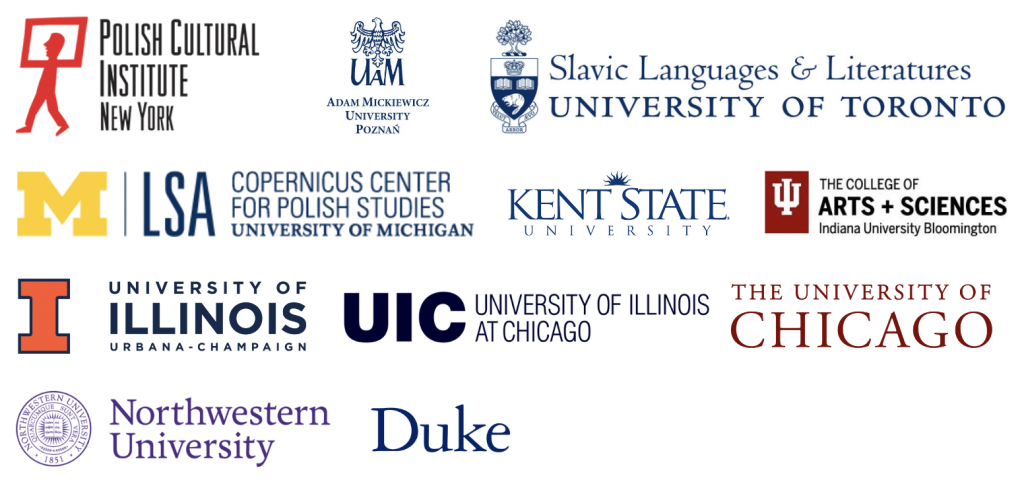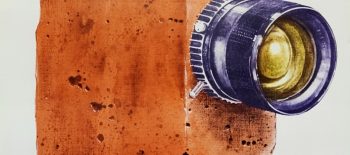January 4, 2021
Episode 12 and all video recordings are available at:
Polish Cultural Institute New York YouTube
Encounters with Polish Literature is a new video series for anyone interested in literature and the culture of books and reading. Each month, host David A. Goldfarb will present a new topic in conversation with an expert on that author or book or movement in Polish literature. More about the Encounters with Polish Literature series and the timeline.
Continuing our discussion of the Polish school of reportage or creative non-fiction from Episode 10 of “Encounters with Polish Literature” Beth Holmgren and David Goldfarb look at two contemporary works of reportage, History of a Disappearance: The Story of a Forgotten Polish Town by Filip Springer, and Katarzyna Boni’s Ganbare! Workshops on Dying.
Both authors were born in 1982. Filip Springer is a photographer with an interest in Socialist architecture and the aesthetics of the “ugly” that led him to writing reportage. History of a Disappearance was a 2012 finalist for the NIKE prize, Poland’s highest literary award.
Katarzyna Boni went through a more traditional journalistic training at the Institut Reportażu in Warsaw, working as a journalist in Southeast Asia and Japan, and coauthoring a book with Wojciech Tochman, Kontener (Container) about Syrian refugees in Jordan. Ganbare! won the 2017 Gryfia Award, a Polish prize for women writers.
In this episode we look at how the journalistic use of mały realizm (“little realism”) or the use of minor figures or objects to illustrate larger issues has become a creative tool, free of the burden that it had in the 1970s of outwitting the censor. Springer’s chronicle of this seemingly marginal mining town reveals a story that is at the center of the history of the Cold War nuclear arms race. Boni’s story reveals layers of mythology, folklore, and psychological undercurrents in the response to the Tohoku earthquake, tsunami, and Fukushima nuclear disaster of 2011. We also consider the impact that these two examples of reportage have had on cultural life in Poland, inspiring a literary festival in the town of Miedzianka that “disappears” in Springer’s book, and bringing “workshops on dying” as well as an art project from the Fukushima disaster—Itaru Sasaki’s “Wind Telephone”—to Poland as a way of addressing Poland’s own history of trauma.
Selected bibliography:
Boni, Katarzyna. Ganbare! Workshops on Dying. Tr. Mark Ordon. Rochester, N.Y.: Open Letter Books, 2021.
—. “What lies under the water?” (excerpt from Ganbare! Workshops on Dying). Tr. Mark Ordon. Przekrój (March 11, 2020).
Budzisz, Stasia. “I Don’t Believe in Blind Idealism: An Interview with Katarzyna Boni.” Tr. Aga Zano. Przekrój (September 24, 2020).
Springer, Filip. History of a Disappearance: The Story of a Forgotten Polish Town. Tr. Sean Gasper Bye. Brooklyn, N.Y.: Restless Books, 2017.
Additional internet resources:
Katarzyna Boni (personal website)
Filip Springer (personal website)
Filip Springer (profile at Culture.pl)

Beth Holmgren, Professor of Polish Studies and Russian Studies at Duke University, has published widely on Polish literature, theater, popular culture, and film; Russian literature, film, and women’s studies; and Russian and Polish artists and performers in the North American diaspora. Her scholarship and work in the field have won multiple national awards. Her recent scholarship focuses on Polish Jewish cultural history of the interwar period, Polish film from the 1930s until the current day, and 21st-century Polish reportage. Her book Warsaw is My Country (2018), which is a cultural biography of Krystyna Bierzynska, an acculturated Jewish Varsovian who served as a 16-year-old orderly in the 1944 Warsaw Uprising, was based in large part on her interviews with her subject. Holmgren’s most recent book, co-authored with Professor Helena Gościło (The Ohio State University), is Polish Cinema Today: A Bold New Era in Film, which explores the reflorescence and great thematic diversification of Polish film in this century. Contextualizing and analyzing scores of Polish films on themes ranging from representations of the Catholic Church’s influence and prewar/wartime/postwar Jewish-gentile relations to the experience of migrant Poles and portraits of queer identity, Polish Cinema Today provides a smart introduction to general film scholars and students as well as cinephiles.
In addition to her continuing work on various editorial boards of book series and journals, Holmgren served as President of the Association of Slavic, East European, and Eurasian Studies in 2008 (the largest organization in the Slavic field outside the region itself), during which period she helped oversee the Association’s move to a new, financially less exorbitant location and the hiring of several new staff members. Holmgren served as President of the Association for Women in Slavic Studies for the 2003-2005 term; AWSS has been a major resource for female scholar/teachers’ career development, access to publication venues, and celebrating women’s achievement. At Duke, Holmgren is proud to hold secondary appointments in Theater Studies and Gender/Sexuality/Feminist Studies, and to serve as a core faculty member for Jewish Studies.
This year, in 2021, the Graduate Student Essay Prize of the Association for Slavic, East European, and Eurasian Studies this year has been renamed “The Beth Holmgren Graduate Student Essay Prize.”

David A. Goldfarb is an independent scholar of Polish literature and literary theory, a literary translator from Polish to English, and a liaison for Polish authors to US publishers. In 2018 he translated feature articles and interviews from Wysokie Obcasy—the weekly women’s supplement to Poland’s main independent daily paper Gazeta Wyborcza—for Newsmavens.com, a pan-European women’s news portal. From mid-2010 to the end of 2013, he was Curator of Literature and Humanities Programming at the Polish Cultural Institute New York, a diplomatic mission of the Ministry of Foreign Affairs of the Republic of Poland. Prior to that he served as Assistant Professor of Slavic Literatures and Comparative Literature at Barnard College, Columbia University.
He holds a doctorate in Comparative Literature from the Graduate Center of the City University of New York as well as an M.A. in Slavic Languages and Literatures from the University of Toronto, and a B.A. in Philosophy from Cornell University and Deep Springs College. He has published articles on Bruno Schulz, Zbigniew Herbert, Stanisław Ignacy Witkiewicz, Mikhail Lermontov, and East European cinema in such journals as East European Politics and Societies, Indiana Slavic Studies, Philosophy and Literature, Prooftexts, The Polish Review, Slavic and East European Performance, and Jewish Quarterly, and he has published book chapters on Jozef Wittlin, Witold Gombrowicz, and Nikolai Gogol and Giuseppe Arcimboldo. He has written the introduction and notes for Tolstoy’s “The Death of Ivan Ilych” and Other Stories and Turgenev’s Fathers and Sons for the Barnes and Noble Classics series, and for the Penguin Classics edition of the The Street of Crocodiles and Other Stories by Bruno Schulz.
Bartek Remisko, Executive Producer
David A. Goldfarb, Host & Producer
Natalia Iyudin, Producer
This project is part of 21-anniversary celebration of Polish Cultural Institute New York.
Lead image: Olga Tokarczuk. Photo by Łukasz Giza.
Partners:




